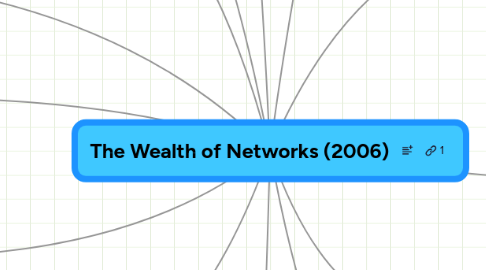
1. Four Methodological Comments
1.1. 1. Technological determinism (NOT!)
1.1.1. Barry Wellman: Affordances
1.1.2. Langdon Winner: Political Properties of Technology
1.1.3. Harold Innis: The Bias of Communications
1.1.4. Lessig: Code is Law
1.2. 2. Economic Analysis & Methodological Individualism
1.2.1. Manuel Castells: Networked Society
1.2.2. looser, flexible arrangement of human affairs
1.2.3. nonmarket production at core of economic engine
1.3. 3. Economic Structure in Liberal Political Theory
1.3.1. a. humans as bears of moral claims
1.3.2. b. actual humans in actual historical settings
1.4. 4. Whiter the State?
1.4.1. a. Rise of individual practical capabilities
1.4.2. b. Role of capabilities in nonproprietary, nonmarket behavior
2. Critical Culture & Networked Social Relations
2.1. emergence of critical, self-reflective culture
2.2. 1. makes culture more transparent
2.3. 2. makes culture more mallable
2.4. the new folk culture
2.5. strengthening strong ties
2.6. longer range and more diverse weak ties
3. Justice and Human Development
3.1. peer production allows for economic opportunity and human development
3.2. creates avenues to address and construct basic requirements
3.3. finished good = better opportunities e.g. OLPC
4. Democracy: The Networked Public Sphere
4.1. Public Spheres: From mass-mediated to networked
4.2. 1st Gen Critique: Babel Objection
4.3. 2nd Gen Critique: Power Law online
4.4. Failure of $$$ mass media for public discourse
4.4.1. 1. too many concerns, too little journalists
4.4.2. 2. Market concentration = Power to shape opinion
4.4.3. 3. oversimplification: inane rather than engaging
4.4.4. key: "peer-review-like" online communities
5. Enhanced Autonomy
5.1. 1. individuals can do more by themselves
5.2. 2. do more in loose commonality with others
5.3. 3. do more for non-market organizations
6. Liberal, Democratic Societies
6.1. Individual freedom
6.2. genuinely participatory politics
6.3. critical culture
6.4. social justice
6.5. Unlimited potential vs. productive systems
7. Observations of Emerging Information Production System
7.1. 1. Non-material = non-proprietary, non-market production
7.2. 2. Aggregation of unconscious information goods
7.3. 3. Peer production of info, knowledge, culture
7.4. e.g. open-source Linux, Wikipedia, SETI@Home
8. "Networked Information Economy"
8.1. 1. New economy
8.1.1. information (software, science)
8.1.2. cultural production (films, music)
8.1.3. symbology (branding)
8.2. 2. Cheap, powerful, networked processors
8.2.1. nonmarket
8.2.2. decentralized
8.2.3. social productions
8.3. traditional communications technology
8.3.1. centralized communication
8.3.2. expensive, politically inaccessible
8.3.3. e.g. printing presses, telegraphs
8.4. Internet
8.4.1. decentralized communication
8.4.2. cheap, globally accessible
8.4.3. e.g. blogs, wikis
9. ORIGINS
9.1. The Wealth of Nations by Adam Smith (1776)
9.1.1. 1. Invisible hand (benefit through self-interest)
9.1.2. 2. Meritocracy (individual talent vs. external interference)
9.2. A Theory of Justice by John Rawls (1971)
9.2.1. Justice = Fairness (social contract)
9.3. The Rise of the Network Society by Castells (1996)
9.3.1. network of individualized labor
9.3.2. “the work process is globally integrated,
9.3.3. but labor tends to be locally fragmented”
9.4. Coarse's Penguin by Benkler (2002)
9.4.1. Modes of Production
9.4.1.1. 1. market prices
9.4.1.2. 2. managerial commands
9.4.1.3. 3. social signals
9.5. Sharing Nicely by Benkler (2004)
9.5.1. sharing private, excludable, "systematic overcapacity" goods
9.5.2. e.g. carpooling, distributed computing
9.6. Democratizing Innovation by Eric Von Hippel (2005)
9.6.1. Modify Your Merchandise = Adds Value
9.6.2. MAKE: Void Your Warranty

